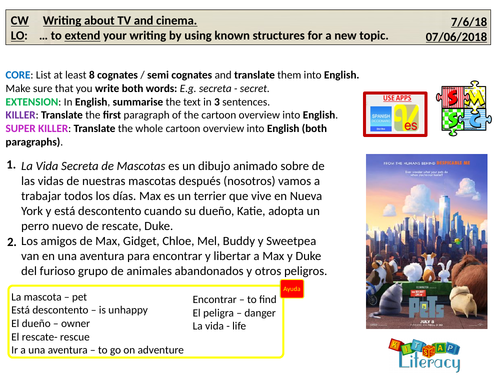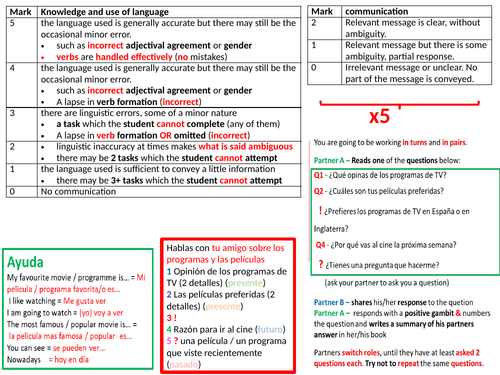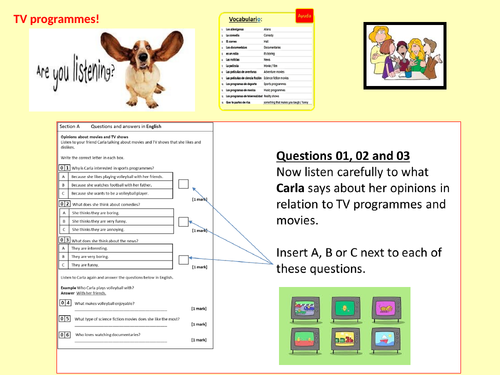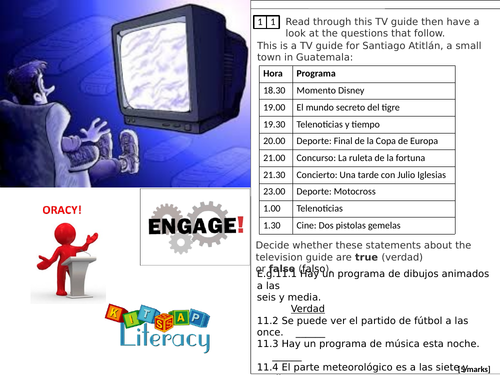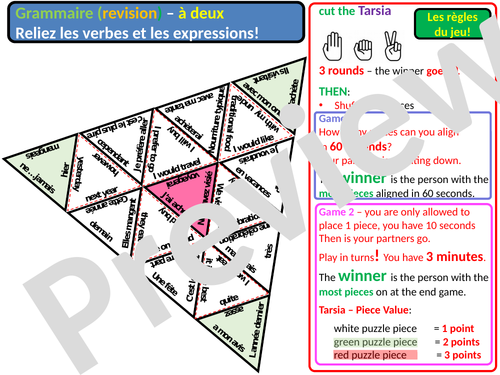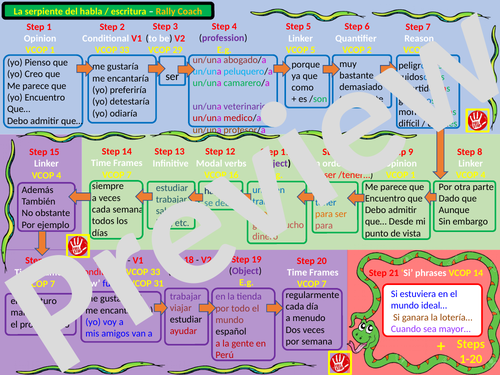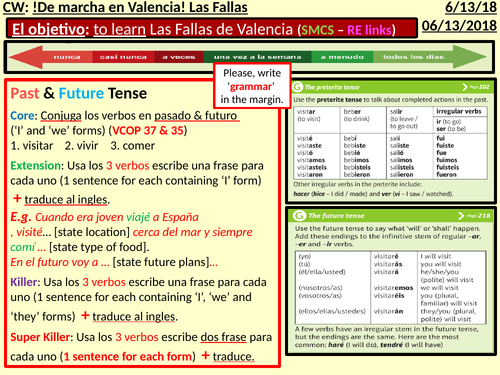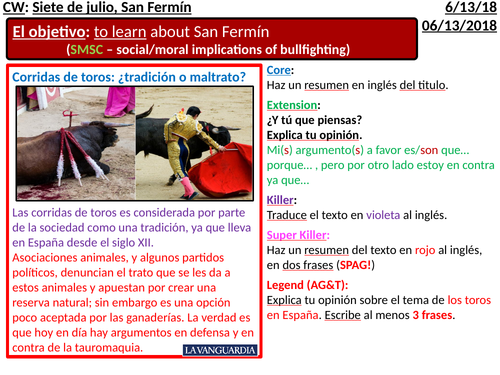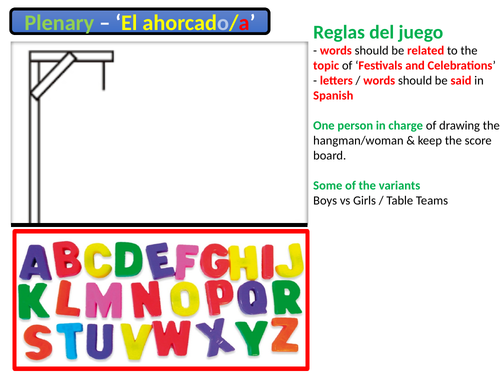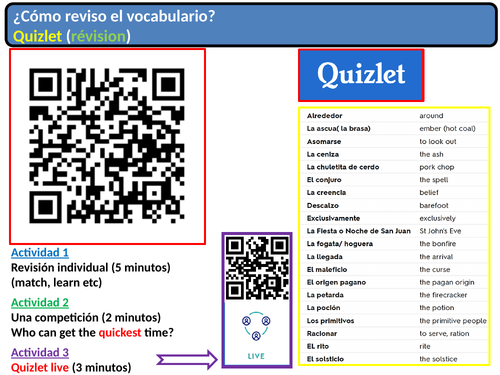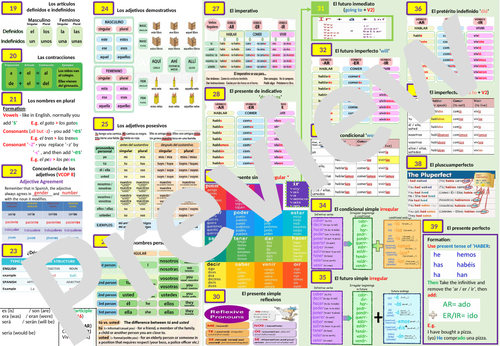
121Uploads
36k+Views
5k+Downloads
Languages
Bundle

Free time: Cinema / TV- Spanish AQA GCSE/ older KS3 - 4 lessons + Project + Speaking frame (Reading, Listening, Writing, Speaking)
This is a bundle of 4 lessons and a research project in relation to the topic of Free-time activities, subtopic TV and cinema in the AQA GCSE specification (originally for the y8 / early GCSE year but can also be used for revision for years 10 &11). These lessons are prepared for the topic of general vocabulary on TV and cinema and opinions. Each lesson highlights different part of the exam hence the 4 of them have Reading, Listening, Writing and Speaking (Role-play) task. The bundle is finalised with the research project which includes the structures and grammar from the whole topic, that can be changed / adapted / differentiated further to your needs. I have also included the speaking framework for the Part 3 of the Higher Tier exam that can also be used in writing practice.

Spanish Trailer of Secret Life of Pets
Hi everyone! I realised that some things disappear from Youtube, including trailers which are very useful to engage students.
I have therefore downloaded this trailer to use for educational purposes only.

Writing: TV and cinema (opinions) - Spanish - AQA KS3/KS4 GCSE (Speaking / Writing)
This is a lesson on TV shows for an early GCSE Spanish class which can be used with a higher year 8 students.
The lesson starter is a differentiated reading / writing / grammar task based on the review of a famous cartoon - Secret Life of Pets. Students read the overview of the cartoon and complete the tasks. Then they check the answers followed by phonics practice (resiting tongue twister!). Then I included a mini-test to recap / check whether students remember how to conjugate ‘tener’ in present tense. Consequently they play the Speaking Cube - 6 sides of the cube are completed with the topic questions for the half-term. Students roll a cube (you can either ask them to glue them together or you can make them yourself). I figured 6 cubes per year for each year group is an easy enough task to continue repeating the questions of all half-terms for the whole school year. The template is in the end of the lesson in case you need to change the questions (colours correspond to the difficulty of the question (core- blue, extension is green, violet is killer and pink is super killer).
Then they get to revise verb 1 + verb 2 structure and complete a writing task. Before writing I tried to give them some ideas by showing them the Spanish trailer of the cartoon mentioned in the starter activity (they loved it!). The trailer is from Youtube. Finally they self/peer -assess their work by way of analising the success criteria and play a vocabulary game as a reward. The younger students might be allowed to use a dictionary or to think of any word. In any case, feel free to change the rules!
Please let me know if there are any problems / ideas! Enjoy!

Role-play: opinions on TV / movies - Spanish - AQA KS3/KS4 GCSE (Role-play)
This is a lesson on TV shows for an early GCSE Spanish class which can be used with a higher year 8 students.
The lesson starter is a recap on some simple concepts (articles / gender / adjectival agreement/ spelling) to wake the students up followed by phonics practice (resiting tongue twister!). Then I included a mini-test to recap / check whether students remember topic-related vocabulary.
Then they get to revise topic words via online quizlet activity. Students are to choose what quizlet task they want to do based on their level therefore this engaging task is differentiated. Then I have included a game - Roll-A-Word - Students roll a dice to complete different tasks related to the new and / or familiar words (both learning and revising). They count the value of the completed dices to make the task more competitive. Then they revise question words and how to form different types of questions in Spanish. They then jot their thoughts on a Role Play task in pairs (using grammar help - note: we use VCOP mat so if you have one you will need to change the numbers of the grammar points, if not you need to delete few bits, the examples of structures are provided anyway) and complete in in writing individually . Then their ‘Time Pair Share’ the Role Play and self/peer -assess their work by way of analising the success criteria (you might want to show it prior to the task for the novices).
Please let me know if there are any problems / ideas! Enjoy!

Opinions on TV programmes - Spanish- AQA GCSE Listening (Sec. A- multiple choice / 1 detail asnwer)
This is a lesson on TV shows for an early GCSE Spanish class which can be used with a higher year 8 students.
The lesson includes a translation starter (mini-Reading Section C) to wake the students up followed by phonics practice (resiting tongue twister!). Then I included few mini-tests to recap / check understanding of basic grammar (articles, indirect object pronouns and adjectival agreement).
Then they get to know new words via online quizlet activity. Students are to choose what quizlet task they want to do based on their level therefore this engaging task is differentiated. Then I have included a quick match-up activity to check whether they remember the words they have just learned. I then introduce a Listening activity related to the opinions on TV watching preferences. It has two parts - multiple choice and one detail answer to account for two types of tasks in the Listening exam spec. Students complete a series of tasks to enhance their understanding - translate the keywords into Spanish to make the Listening easier, discuss unknown words in a group and use applications / dictionaries to find out the meaning of the unknown words. Finally they analise the way they should answer the questions , complete the task and self-assess their work. I have included the handout with the task to ease the pain. Please note that there is no listening file - see the end of the presentation for teacher’s handout and for the students one.
Enjoy!

TV shows / TV program - Spanish- AQA GCSE Reading (Sec. A- T/F) differentiated
This is a lesson on TV shows for an early GCSE Spanish class which can be used with a higher year 8 students. The lesson includes a scrabble starter to wake the students up followed by phonics practice (resiting tongue twister!). Then I included few slides explaining how to use VES application to check the meaning of conjugated verbs and asked them to try to find few on their own to check understanding and to encourage them to be independent.
Then they practice phonics when pronouncing new words (see new vocabulary attached - quizlet) followed by the quizlet activity. Students are to choose what quizlet task they want to do based on their level therefore this engaging task is differentiated. Then I have included a set of slides to introduce a reading section A exam task text - TV program (please note that this is a task taken from BBC Bitesize website and I bear no right on it therefore) . There is also a differentiated Rally Coach activity to consolidate the knowledge of the new vocabulary after they looked at the task whereby they try to translate the sentences in relation to opinions on TV programs. Consequently they have a look at the TV program text again and complete a series of tasks to enhance their understanding - underline cognates, discuss unknown words in a group and learn how to use Spanish Dict application (an explanatory slide given). Finally they analise the way they should answer the questions (True / False) and complete the Reading task and self-assess their work. I have included the handout with the reading task to ease the pain.
Enjoy!
Bundle

AQA GCSE Spanish - Speaking (Photo card, Role Play, Conversation) (Foundation/Higher) answer strategies
These are the templates that I prepared for my higher year 8 Spanish students and early KS4 in relation to answering Speaking questions (Photo card and Role Play as well as Conversation - see Writing Q2/Q4).
They include different sets of activities and games to answer the questions of the AQA GCSE exam. The tasks are set for my Foundation tier but might as well work for Higher if mildly redacted.
Please let me know how it goes!

AQA GCSE French - Writing (Foundation) answer strategy - Questions 2 and 4 / Higher Question 1
This is a template that I prepared for my higher year 8 students and early KS4 in relation to answering a Writing Foundation Questions 2 and 4 // Higher Tier Question 1. The topic of this example is celebrations / festivals.
Students begin by translating the short text into English and coaching each other if stuck at the same time assessing each other’s work. Then they revise some grammar by playing tarsia game (see template in the end of the presentation).
Consequently they get on with reading the question and what is required from them and discussing the what they could include in their answer (both content and grammar structures). Then they make a break and play a dice game (can be prepared prior to the lesson or during the same - see template in the end of the presentation) and a learning grid to revise verb tenses. They then get back to the task and work in pairs to plan their answers. Finally they complete the task individually, discuss the success criteria and the marking scheme with the teacher and peer / self assess their work.
Please let me know if there are any problems / ideas!

KS3/KS4 French-Speaking Cube/Tarsia/Conjugation Learning Grid Games (speaking / writing / revision)
These are two grammar games that I decided to share. I would use them for pretty much all age groups, both KS3 and KS4, GCSE both tiers. They can be easily amended to suit the grammar topics that you wish to reinforce / revise / introduce.
See enclosed:
Tarsia slide and template - an activity to use to revise topic / key vocabulary. Students can either create their own or just cut the one you prepare for them. They need to then match the words / expressions in English with their French equivalents.
Speaking Cube - 6 sides of the cube are completed with the topic questions for the half-term. Students roll a cube (you can either ask them to glue them together or you can make them yourself). I figured 6 cubes per year for each year group is an easy enough task to continue repeating the questions of all half-terms for the whole school year. I included an origami version of the cube in case you wish to ask them to make the cube and to write the questions on their own (I took the scheme from the Google images so I do not claim any rights on that one.)
Verb conjugation Learning Grid (differentiated) - Students roll two dices to identify the tense and the pronoun they need to use. To make the task more complicated for more advanced students I ask them to create a sentence using the verb they got with particular amount of words to further challenge higher tier students. I would highly recommend it for the KS4 students.
Let me know how it goes!

AQA GCSE Spanish Games Conjugation Learning Grid and Cube// El Bingo (grammar/vocabulary/ revision)
These are few grammar games that I decided to share. I would use them for pretty much all age groups, both KS3 and KS4, GCSE both tiers. They can be easily amended to suit the grammar topics that you wish to reinforce / revise / introduce. The templates can also be easily reused for French.
See enclosed:
Verb conjugation Learning Grid (differentiated) - Students roll two dices to identify the tense and the pronoun they need to use. To make the task more complicated for more advanced students I ask them to create a sentence using the verb they got with particular amount of words to further challenge higher tier students. I would highly recommend it for the KS4 students.
El Bingo (good to promote Vocabulary / Listening / Phonics). Teacher gives studnets 15 words and asks them to write 5 of them down. Teacher then either says the translation of the words on the board (KS3) or defines them in Spanish / English (y9/10/11). If students recognise one of their words they cross it out, first one who crosses 5 wins!
Conjugation Cube. Students create a set of two dices that they will roll together. There are two versions of them to provide for two levels of differentiation. Students play in turns to conjugate the verbs! I included an origami version of the cube in case you wish to ask them to make the cube and to write the questions on their own (I took the scheme from the Google images so I do not claim any rights on that one.)
Let me know how it goes!

AQA GCSE Spanish Games Roll-a-Word//Speaking Cube// OXO (speaking / writing /translation / revision)
These are few grammar games that I decided to share. I would use them for pretty much all age groups, both KS3 and KS4, GCSE both tiers. They can be easily amended to suit the grammar topics that you wish to reinforce / revise / introduce. The templates can also be easily reused for French.
See enclosed:
Roll-A-Word - Students roll a dice to complete different tasks related to the new and / or familiar words (both learning and revising). They count the value of the completed dices to make the task more competitive.
Speaking Cube - 6 sides of the cube are completed with the topic questions for the half-term. Students roll a cube (you can either ask them to glue them together or you can make them yourself). I figured 6 cubes per year for each year group is an easy enough task to continue repeating the questions of all half-terms for the whole school year. I included an origami version of the cube in case you wish to ask them to make the cube and to write the questions on their own (I took the scheme from the Google images so I do not claim any rights on that one.)
OXO - One of my favourite tasks to develop spontaneous speaking. Students play OXO in turns following the rules. The ? (= random/phantom question or topic) can be used to increase the level of complexity of the game. Furthermore, a certain set of rules can be imposed, e.g. ‘ensure you use a preterite tense of your choosing as main verb of the ‘!’ box. It can be played using ‘home and away’ tables, i.e. grouping students by ability bands, so that all low/medium/high band students play together, which might, for example, allow the teacher to put in place bespoke interventions to support those in need of guidance. I have included three templates of OXO that can be used as a speaking, writing and translation tasks, differentiated according to the level of knowledge and KS group. See noted for additional ideas and hints.
Let me know how it goes!

KS3/GCSE Spanish-MAT-La serpiente del habla (Jobs)-independent Speaking/Writing (differentiated)
This is a differentiated Speaking / Writing exercise that I tend to use every half-term to encourage spontaneous speaking / writing. It is a variation of a trap door exercise that can be adapted for every topic as only topic specific vocabulary changes (not connectives / frequencies / opinions). This particular mat is to speak / write on the topic of (Future) Jobs / Employment plans.
Enjoy!

KS3 KS4 Spanish - SKILLS - How to use a dictionary effectively / Aste Nagusia
This is the resource that I have prepared for both GCSE and KS3 classes. It can be used as a template as the only thing you would change is the text and the words. I believe the full set of slides needs to be used several times until a group of students remember the sequence of actions. The only thing left is to continue revisiting to gain confidence in using the dictionary!
The text that I chose to introduce this task is based upon short cultural texts on the topics of a Basque festival, Aste Nagusia, and Las Hogueras de San Juan. Students look through the first text and analyse the explanation of different things one can find next to the Spanish word in a dictionary. Then they compete (a game!=team challenge) to translate the words.
Then they work in teams to figure out how to use the bi-lingual dictionary effectively - they analyse simple words used in classroom language and try to find their meaning in Spanish at the same time not forgetting to pay attention to gender of the nouns and adjectival agreement (extension - they think of more examples of words they could use). For KS4 students you might add another level of difficulty - include verbs in English in different tenses and let them decide how to correctly translate these verbs in Spanish.
Finally they have a look at the second text and try translating it themselves into English (or given words / very simple text if KS3)
The most important thing in my point of view is to remember that translating is an art not a precise science!
NOTE: I used a dictionary cut outs from the internet which is most likely an extract from Collins Eng-Sp and Sp-Eng dictionary.

GCSE Spanish - SMSC / Cultural -El Carnaval - Photo Card (AQA)
This is the lesson that I have prepared for my higher y8/ and y9/y10 in relation to the topic of Spanish culture (Festivals & Celebrations) and is mostly related to El Carnaval. I used it as a general topic to look at the photo card task (speaking / foundation writing). The starter focus is reading - students complete differentiated tasks in relation to an authentic extract from on line newspaper.
Students will then learn new / revise already known vocabulary on the topic of carnivals/ festivals using Quizlet and Quizlet live tools. Then they recap on the success criteria for Speaking Q2 / Writing Q1 - Photo card- and complete a photo card task based on a photo of a carnival celebration together. They jot their thoughts first, play a catchphrase game and then prepare their responses in pairs on the second photo card. Finally they complete a third photo card task individually and self / peer assess the same. In-between the photo cards I inserted some verb games to make the lesson more fun for the students and not to let them get bored.
Let me know what you think!

AQA GCSE Spanish - SMSC/Cultural- Las Hogueras de San Juan Listening A + writing FQ1/ HQ4
This is the lesson that I have prepared for my higher y8/ and y9/y10 in relation to the topic of Spanish culture (Festivals & Celebrations).
The starter is based on the review of the cartoon called ‘The Book of Life’ (El Libro de la Vida). Students read the review and complete various tasks according to their ability. Then they check their answers, review the lesson objectives and have fun resiting a tongue twister (I personally believe phonics is the way forward for the students of all ages). Students will then learn new / revise already known vocabulary on the topic of Las Hogueras de San Juan festival using Quizlet and Quizlet live tools. I have then included a video (see link) of Rosa from SpanishPod101 (see their channel in youtube) describing the festival.
Even though the video is in Spanish and Rosa speaks really quickly, there are subtitles in English so that all students have a chance to listen to a native speaker and at the same time understand what the video is about (note: I personally find the Spanishpod101 videos amazing as they address quite a few cultural / grammar / pronunciation and other aspects so I would recommend letting your students know that a lot of resources are available for free. Consequently, students answer quiz questions about the video. I presented it as a Listening task.
Then they move on to Writing Foundation Questions 2 and 4 // Higher Tier Question 1. Students begin by translating the short text into English and coaching each other if stuck at the same time assessing each others work. Then they revise some grammar by playing tarsia game (see template in the end of the presentation).
Consequently they get on with reading the question and what is required from them and discussing the what they could include in their answer (both content and grammar structures). Then they make a break and play a dice game (can be prepared prior to the lesson or during the same - see template in the end of the presentation) and a learning grid to revise verb tenses. They then get back to the task and work in pairs to plan their answers. Finally they complete the task individually, discuss the success criteria and the marking scheme with the teacher and peer / self assess their work.
And, as a reward they play Hangman! (I have posted this slide for free within my resources - search for ‘El ahorcado’).
Please let me know if there are any problems / ideas!

GCSE Spanish - SMSC / Cultural - Las Fallas - Listening/ Photo Card/ Reading C (AQA)
This is the lesson that I have prepared for my higher y8/ and y9/y10 in relation to the topic of Spanish culture (Festivals & Celebrations). The starter focus is the Past Simple (preterite) and the Future SImple (‘will’). We use Viva books so I included help boxes as a reminder for those who do not clearly remember the endings. Students will then look at the speaking questions of the half-term, analysing them and trying to come up with a set of ideas for a response. I have then included a video (see link) of Rosa from SpanishPod101 (see their channel in youtube) describing the celebration of Las Fallas.
Even though the video is in Spanish and Rosa speaks really quickly, there are subtitles in English so that all students have a chance to listen to a native speaker and at the same time understand what the video is about (note: I personally find the Spanishpod101 videos amazing as they address quite a few cultural / grammar / pronunciation and other aspects so I would recommend letting your students know that a lot of resources are available for free. Consequently, students answer quiz questions about the video. I presented it as a Listening task. They annotated the questions and complete the task using vocabulary help.
Students will then learn new / revise already known vocabulary on the topic of Las Fallas festival using Quizlet and Quizlet live tools. Then they recap on the success criteria for Speaking Q2 / Writing Q1 - Photo card and complete a photo card task based on a photo from La Tomatina celebration together. They jot their thoughts first, play a catchphrase game and then prepare their responses in pairs on the second photo card. Finally they complete a third photo card task individually.
Finally they read and analyse the grammar in the text about festival to complete AQA Higher Reading Section C task (translation). I included some grammar tips for them and highlighted them in the text to make it easier. Then they complete the task, check their answers, self assess themselves and play Hangman (as a reward for hard work!). Enjoy!

GCSE Spanish- 6 Starters -Cultural/SMSC (differentiated -5 levels)-Speaking, Reading, Writing skills
This a set of Starters with answers that could be used either for the lessons from the topic of festivals and celebrations or as a stand out SMSC - Cultural starter. I included answers so that children can check their answers. These are mostly for higher y8 or for KS4 lessons, differentiated (CORE, EXTENSION, KILLER, SUPERKILLER, LEGEND). All of the instructions are in Spanish.
They can also serve as a template to create your own tasks - just change the text and (slightly) the questions.
First Starter is on the topic of San Fermin and includes an authentic text from the ‘La Vanguardia’, an on line newspaper. The examination focus of this starter is Reading. Second Starter features similar tasks but a different text, also authentic.
The third one is on the topic of La Tomatina and is essentially a Role-play task with success criteria. It therefore focuses on Speaking.
The fourth one is a Photo card Starter on the topic of Aste Nagusia (or festivals in general) with help and instructions and therefore can be used as a Speaking / Writing activity. Fourth one follows the same idea but is designed for the topic of holidays.
The fifth is a grammar starter for any holidays topic and its focus is the Past Simple (preterite) and the Future SImple (‘will’). We use Viva books so I included help boxes as a reminder for those who do not clearly remember the endings.
The sixth starter focuses on Reading (parts B and C). Students translate and analyse the adjectives in the Wordle.
Let me know what you think!

GCSE Spanish - Vocabulary GAME - el ahorcado - Hangman slide
One of the most popular word games ever… And students love it as a reward for a good work during the lesson!

GCSE Spanish - Revision GAME - Quizlet Quizlet live Template Slide
This is template slide for a PowerPoint Presentation based on Quizlet revision website. (https://quizlet.com)
I usually use it either to revise known words or to learn new ones prior to completing a set of reading / writing / listening / speaking exercises on a set topic.

AQA GCSE (KS4) / KS3 VCOP - Spanish Literacy Mat
This a VCOP / Literacy Mat that I have prepared for my KS3 and KS4 classes. I prepared it to reflect AQA examination criteria however I believe Spanish language does not change in-between different examination organisations so can be used for different ability students studying for different types of exams. It covers 39 different grammar structures including main verb tenses and popular structures that I recommend my students use for their writing, speaking and reading practice (and learn to identify when listening). It is partially differentiated (see groups highlighted in 3 colours - blue for Core, green for Extension, red for Killer). Parts of the mat with green background represent the most popular verb tenses and verbal structures.
I have included the most useful (in my point of view) opinions, adverbs, exclamations, connectives, linking expressions, quantifiers, time expressions, question words, V1 + V2 structures, subjunctive and conditional phrases, gerunds and few more expressions that worth few shiny points if used during the exam. I have considered it would be useful to include the endings and explanation on how to follow adjectival agreement rules, use correct articles and pronouns. In relation to verb tenses, providing there is not as much space as it seems to be, I have included the verb tables for present simple (regular and irregular + self-reflexive), imperative, immediate (near) future, ‘will’ future, regular and irregular conditional, past simple, imperfect and past perfect (for those who are truly passionate about grammar.
If you wish to add something just amend / move few boxes and you will be done. If printing, I would recommend to do so on A3 to ensure that all of the instructions are clearly visible.
Note: to remove ‘Preview’ just select it and delete - it is just one text box. Let me know how it goes and what you think!



